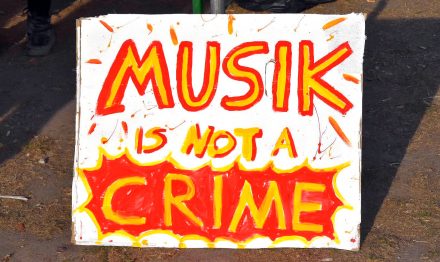The hot summer months in Mauerpark are over for this year and so things should start to quieten down naturally: the crowds, the music and the protests.
So it is time to take stock and the attempt to do that has led to intensive discussions among all stakeholders: local residents, street musicians in and round the park, the parks and gardens’ department, the Public Order Office, the police and local politicians.
There is a feeling of frustration across the board:
- Playing music without an amplifier is still allowed in Mauerpark but it is simply not practical for street musicians.
- The Public Order Office does not have the capacity to ask musicians and park users to comply with the regulations.
- The police and the Public Order Office do not have adequate measuring equipment and are therefore obliged to pursue each reported disturbance even if it is only subjective and not actually exceeding the permitted decibel level.
- Local residents who are upset by the noise feel abandoned and that there only remedy is to hope for rain or colder weather.
The discussions on the Internet and at our information stand in Mauerpark very quickly became emotional. It was predominantly about subjective perceptions. With all due respect for people’s feelings, it is crucial that we explore the facts if we are to be able to work together and find solutions.
- What is the level of noise that impacts on local residents?
- Which streets and which apartment blocks are affected?
- What other factors – including those that have nothing to do with Mauerpark – are contributing to people feeling disturbed.
- Have different sources of noise and different times of day been taken into account?
- How can park users help ensure that people living near the park suffer less disturbance?
- Can any structural measures be taken to provide a barrier against the noise?
It would be helpful to enter into a dialogue that gives all parties the opportunity to voice their points of view and needs. The Mauerpark Roundtable launched in September by the Kulturgemeinschaft offers a suitable communication forum for discussing various problems at regular intervals and developing solutions.
The ball is then in the court of politicians: they must come up with concrete instructions for public authorities, detailing how Mauerpark can be conserved as an important social and cultural venue, on the one hand, while effectively protecting local residents from extreme disturbance caused by inconsiderate behaviour, on the other hand.
It would be a good idea to deploy professionals in the park, who would act as a point of contact for all stakeholders and would have the job of making sure people act with greater consideration for each other. The Kulturgemeinschaft Mauerpark already took the first step in this direction with its Respect the Neighbourhood project, putting information posters on the pavements outside Mauerpark and at the entrances, and talking with the street musicians.
Mauerpark has developed into a haven of cultural diversity in an atmosphere of friendliness and cooperation. We must not allow it to become a place of conflict, culminating in the exclusion of certain user groups. In the course of its long history, Mauerpark has undergone an extraordinary evolution. Once the site of the “death strip” separating East and West Berlin, it is now valued as a place where people of all nationalities come together. We need to take this spirit into the discussions and talk to each other from the heart and not with a clenched fist.
The Friends of Mauerpark association will work with Mauerpark’s Kulturgemeinschaft to support this dialogue and do all it can to find solutions that reconcile the interests of all groups.


